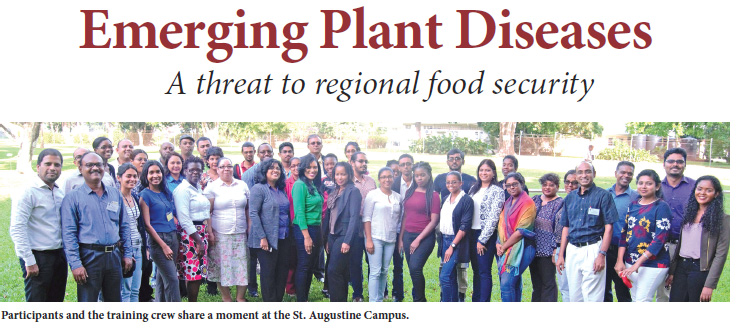

Emerging plant diseases are caused by pathogens which can develop into epidemics that may be both unexpected and devastating. These diseases may be newly discovered or recognized ones and are caused by pathogens that have increased in incidence or a change in geographical/host range or newly evolved pathogens.
A significant number has been recorded as emerging diseases in the Caribbean region and they are considered a serious threat to plant growth and productivity and consequently, to regional food security.
The Plant-Microbe research group at the Department of Life Sciences (DLS) has identified several emerging pathogens of vegetable crops of the Caribbean region through extensive field surveys and laboratory research. However, practically there are serious challenges associated with the identification of emerging diseases, detection of pathogens and further control of such diseases in the field.
The group held a training programme in December 2017 with the United Nations University-BIOLAC Programme on “Molecular Diagnosis of Emerging Plant Diseases and Integrated Management of Plant Health.” It was meant to highlight the current knowledge in molecular diagnosis of emerging plant diseases in the Caribbean region and application of biotechnological approaches for field disease management.
The 27 trainees included agricultural officers, extension officers, technicians, laboratory managers, researchers and students from around the Caribbean.
The inaugural ceremony was chaired by Dr. Margaret Bernard, Deputy Dean for Graduate Studies, Research and Innovation, FST. Dr. Adesh Ramsubhag, Head DLS and Co-Programme Director welcomed the gathering. Prof. Jayaraj Jayaraman, Director, UNU-BIOLAC Training, introduced the objectives and activities of the training programme. Prof. Indar Ramnarine, St. Augustine Campus Deputy Principal, and Mr. Dale Nandlal, Director of the Research Division of the Ministry of Agriculture, Land and Fisheries, brought greetings.
Senator Avinash Singh, Parliamentary Secretary in the Ministry of Agriculture, spoke on the importance of the diseases vis-a-vis national food security. Mr. Nelson Leville, Head of the Plant Protection and Quarantine, Ministry of Agriculture, Dominica, spoke on behalf of the trainees. Mr. Antonio Ramkissoon, Research. Associate, DLS, delivered the vote of thanks.
Several topics were covered in the training through lectures and discussions, and practical laboratory sessions provided hands-on experience on classical methods of disease diagnosis, pathogen isolation, and others. During the sessions, various strategies for management of emerging plant diseases were discussed.
The crucial role of UWI in offering knowledge support for addressing this important challenge on food security was very much sought and highlighted by the participants and the partnering institutions. The conveners assured of the University’s continued engagement on research and development and organization of subsequent trainings in the near future. |





